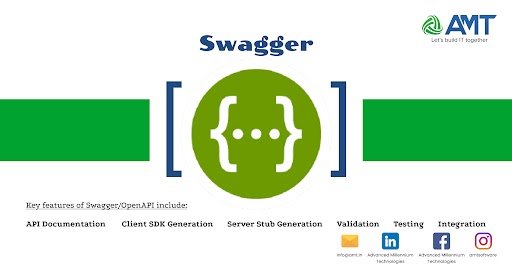Swagger is an open-source software framework backed by the OpenAPI Initiative that enables developers to design, build, document, and consume RESTful web services. It allows developers to define the structure of their APIs using a standard format called OpenAPI Specification (formerly known as Swagger Specification), which is based on JSON or YAML formats.
Key features of Swagger/OpenAPI include:
- API Documentation: Swagger generates interactive API documentation from the OpenAPI Specification. This documentation provides details about the available endpoints, request parameters, response formats, authentication methods, etc. It helps developers and consumers understand how to use the API.
- Client SDK Generation: Swagger can automatically generate client SDKs (software development kits) in various programming languages based on the API specification. This simplifies the process of consuming the API for developers in different programming environments.
- Server Stub Generation: Similarly, Swagger can generate server stubs, which are skeleton code implementations of the API endpoints in various programming languages. Developers can then fill in the business logic to create the functioning API server.
- Validation: Swagger provides validation capabilities to ensure that the API implementation adheres to the defined specification. This helps maintain consistency and compatibility between different versions of the API.
- Testing: Swagger facilitates API testing by allowing developers to send requests to API endpoints directly from the documentation interface. This helps in quickly verifying the behavior of the API without the need for additional tools.
- Integration: Swagger integrates with various development tools and frameworks, including IDEs (Integrated Development Environments) like Visual Studio Code and build automation tools like Maven and Gradle. This integration streamlines the API development workflow.
Overall, Swagger/OpenAPI simplifies the process of designing, documenting, and consuming APIs, thereby improving the efficiency and effectiveness of API development projects.
Here are some additional details about Swagger/OpenAPI:
- Versioning: Swagger supports versioning of API specifications, allowing developers to manage changes and updates to the API over time. Versioning ensures backward compatibility and helps API consumers understand which version of the API they are using.
- Security: Swagger allows developers to define security requirements for their APIs, including authentication methods such as OAuth, API keys, and JWT (JSON Web Tokens). This ensures that only authorized users can access protected endpoints and data.
- Customization: Swagger provides various customization options for API documentation, including customizing the appearance, layout, and styling to match the branding or requirements of the organization. Developers can also add additional metadata and descriptions to enhance the documentation.
- Extensibility: The OpenAPI Specification is extensible, allowing developers to define custom properties and extensions to meet specific requirements not covered by the standard specification. This flexibility enables the representation of a wide range of API designs and architectures.
- Community Support: Swagger/OpenAPI has a large and active community of developers, contributors, and users who provide support, share best practices, and contribute to the improvement of the framework. The community-driven nature of Swagger ensures ongoing development and innovation.
- Ecosystem: Swagger/OpenAPI has a rich ecosystem of tools and integrations, including code editors, testing frameworks, continuous integration/delivery (CI/CD) pipelines, and API management platforms. These tools enhance the development, testing, deployment, and management of APIs throughout the software development lifecycle.
- Adoption: Swagger/OpenAPI has been widely adopted by companies and organizations across various industries, ranging from startups to large enterprises. Its popularity is attributed to its ease of use, robust features, and alignment with industry standards for API design and documentation.
Overall, Swagger/OpenAPI is a comprehensive framework for designing, documenting, and implementing RESTful APIs, offering a wide range of features and benefits to developers and organizations involved in API development projects.
Above is a brief about Swagger. Watch this space for more updates on the latest trends in Technology .
